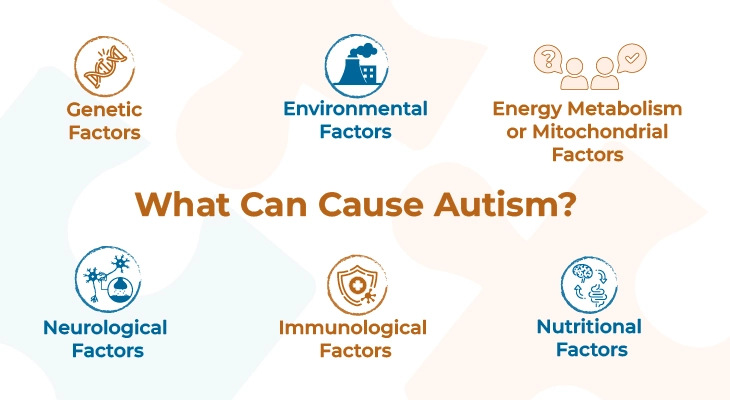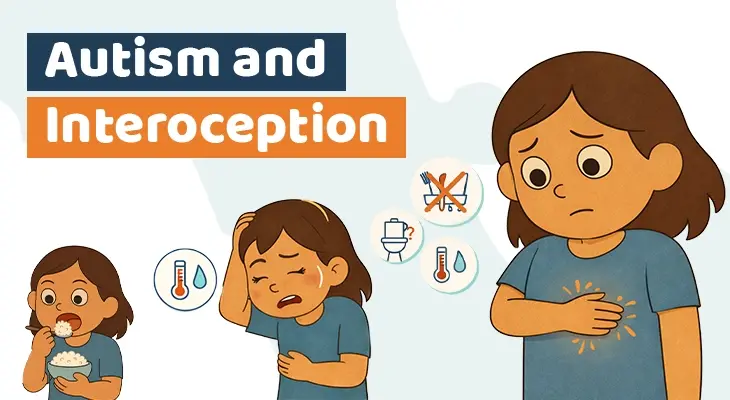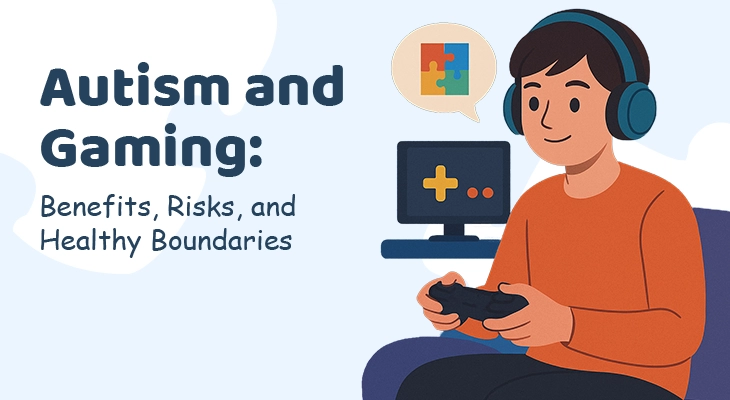Bedwetting, or nocturnal enuresis, is a common childhood issue that typically resolves on its own by the age of five. However, for many children with autism spectrum disorder (ASD), this milestone can be delayed or elusive. In fact, according to a study published in the Journal of Autism and Developmental Disorders, as many as 38% of children with autism experience bedwetting beyond the age of five, compared to only 15% of typically developing children.
This significant disparity highlights the unique challenges faced by children with ASD, and underscores the importance of understanding the underlying factors that contribute to this issue. This blog will delve into the connection between bedwetting and autism, explore potential causes, and offer strategies for parents and caregivers.
Impact Of Bedwetting In Autistic Children & Families
Bedwetting can have a significant impact on the overall well-being of children, but for those with autism, the challenges can be even more pronounced. In the following section, we will explore the various ways bedwetting can affect children on the autism spectrum, from emotional and social well-being to practical considerations.
Emotional Well-being
- Low Self-Esteem: Children with autism, who often struggle with social comparisons, may experience a further decline in self-esteem due to bedwetting. For more insights into the emotional well-being of children with autism, check out our blog on Advice for Parents with Autistic Children.
- Anxiety and Stress: The constant worry about bedwetting can contribute to increased anxiety and stress levels in children with autism, who may already struggle with sensory sensitivities and social challenges. Learn more about managing anxiety and stress in our article on Autism and Social Anxiety – An Overview.
- Frustration and Isolation: Bedwetting can create a sense of frustration and isolation as children may feel different from their peers who have achieved nighttime dryness.
Social and Behavioral Challenges
- Social Withdrawal: Bedwetting can lead to social withdrawal as children may avoid sleepovers, overnight visits, or other social activities that involve sleeping away from home. Discover strategies to navigate social challenges in our guide, Navigating Social Challenges: A Guide for Caregivers of High-Functioning Autistic Children.
- Sleep Disturbances: Frequent nighttime awakenings due to bedwetting can disrupt sleep patterns, leading to daytime fatigue and irritability. For an in-depth look at managing sleep issues, read our blog on Understanding and Managing Sleep Problems in Children with ASD.
- Sensory Issues: The sensation of wetness can be overwhelming for children with sensory sensitivities, leading to distress and behavioral challenges.
Practical Implications On Families
- Sleep Deprivation for Parents: Bedwetting can disrupt sleep for parents, leading to increased stress and fatigue..
- Laundry and Cleaning: Frequent bedwetting can create additional laundry and cleaning burdens for families.
- Financial Burden: The cost of replacing bedding and clothing due to bedwetting can be a financial strain on families.
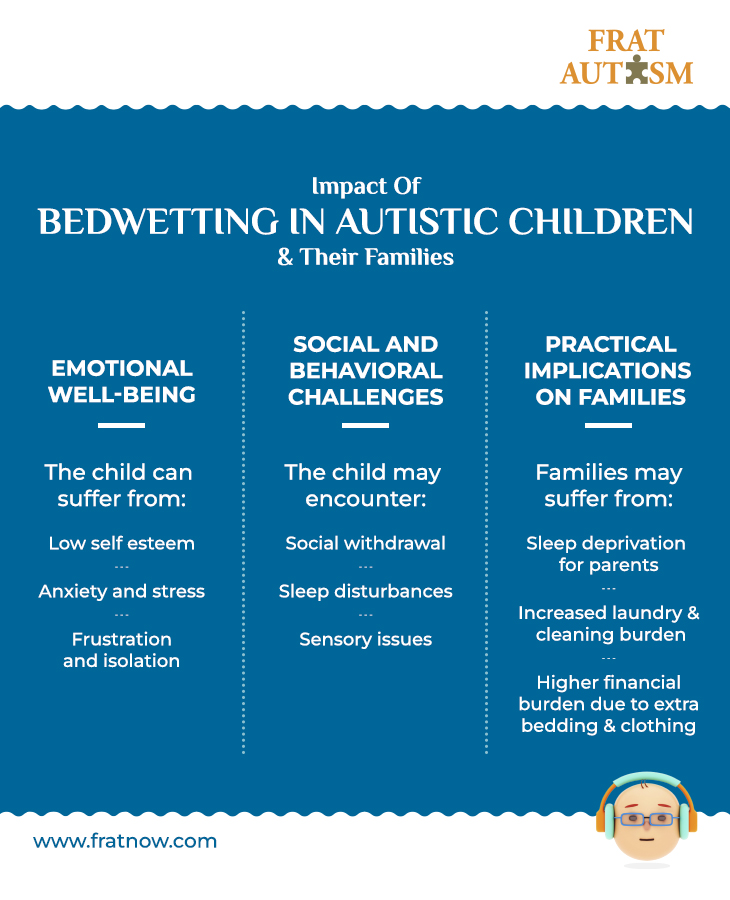
Download Download & share this infograph card in your network [Free Download]
Possible Causes Of Bedwetting In Autistic Children
While the exact causes of bedwetting in children with autism are not fully understood, several factors may contribute to this issue.
Developmental Delays
- Bladder Control: Children with autism may experience delays in developing bladder control, leading to difficulties in recognizing the need to urinate and holding it until an appropriate time. To understand more about developmental delays in autism, read our blog Developmental Delay vs Autism Spectrum Disorder (ASD): What First-Time Parents Need to Know.
- Sensory Processing Issues: Sensory sensitivities can interfere with a child’s ability to perceive bladder fullness, making it challenging to respond to the urge to urinate. For a deep dive on sensory processing issues in autism, read our blog Sensory Issues and Autism: An all you need to know guide for parents & caregivers
Communication Difficulties
- Expressing Needs: Children with autism may have trouble communicating their need to use the bathroom, leading to accidents. Explore more about communication challenges in our blog A Guide to Speech Delay and Autism: Types, Red Flags, Impact and the Power of Early Intervention.
- Understanding Social Cues: Difficulty understanding social cues related to bathroom etiquette can contribute to bedwetting.
Sleep Disturbances
- Sleep Apnea: Sleep disorders like sleep apnea can disrupt sleep patterns and contribute to bedwetting.
- Night Terrors or Nightmares: These can cause intense awakenings and disrupt sleep, leading to accidents.
Anxiety and Stress
- Emotional Regulation: Children with autism often experience heightened anxiety and stress, which can impact sleep quality and bladder control.
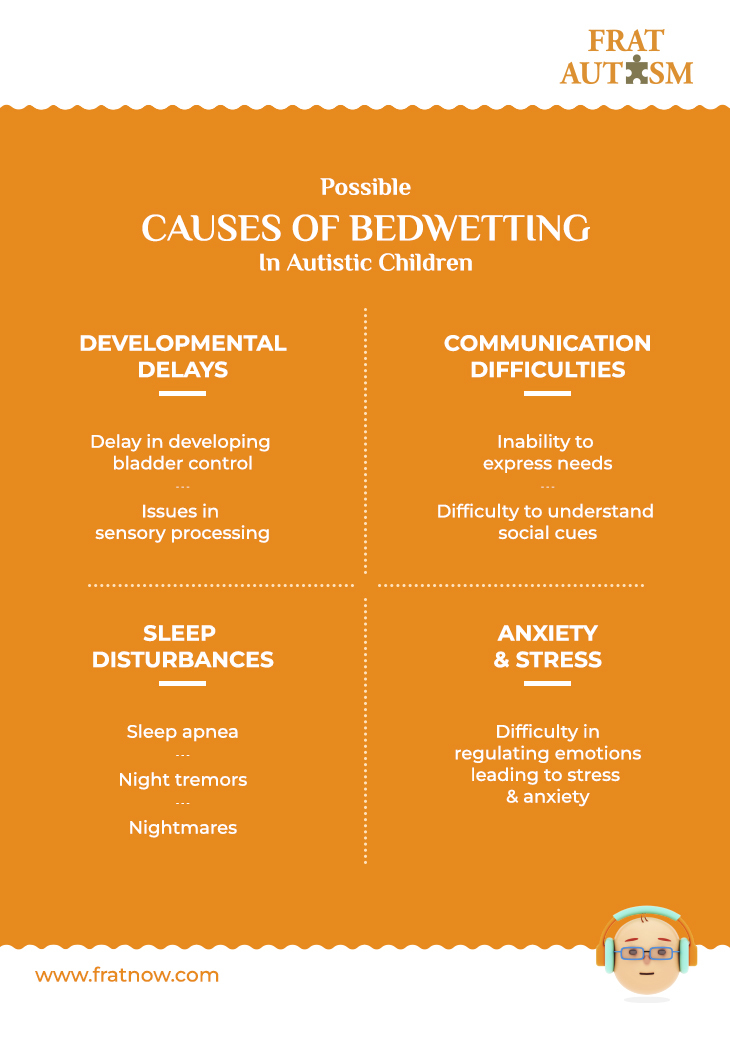
Download Download & share this infograph card in your network [Free Download]
Can Folate And Vitamin B12 Deficiency Contribute To Bedwetting?
A study by the National Library of Medicine suggests a potential link between vitamin B12 and folate deficiencies and bedwetting or primary nocturnal enuresis (PNE).
A study comparing children with bedwetting problems to a control group found significantly lower levels of vitamin B12 and folate in children with bedwetting. These findings raise the possibility that folate and vitamin B12 nutrient deficiencies might contribute to delayed central nervous system (CNS) maturation, a factor linked to bedwetting.
As it is, the deficiency of folate, leading to cerebral folate deficiency, has been found to be prevalent in a significant number of children with autism. When considering these two factors together, there’s a potential link between correcting folate deficiency and improving bedwetting symptoms in some autistic children. However, it’s crucial to note that more research is needed to establish a definitive connection and explore the effectiveness of folate supplementation as a treatment for bedwetting in children with autism spectrum disorder. For more information on folate deficiency in autism, read Cerebral Folate Deficiency – An Overview.
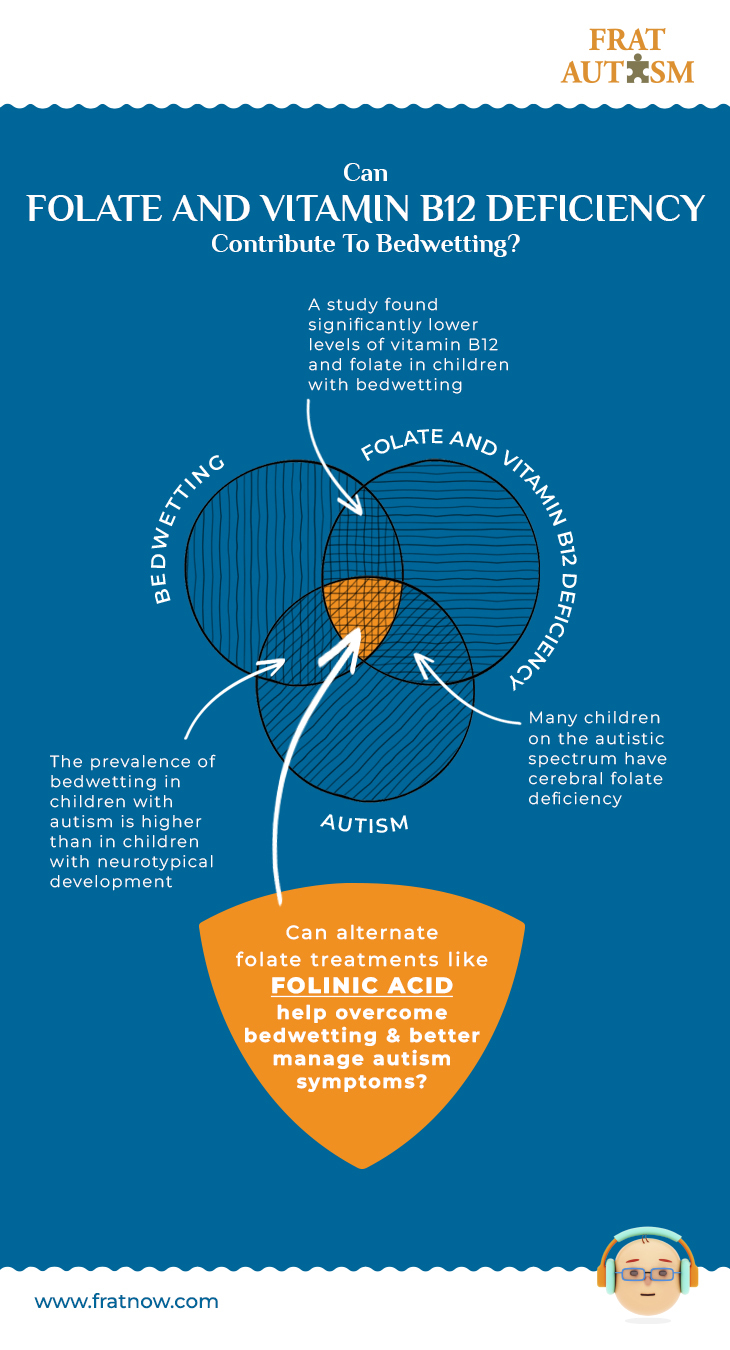
Download Download & share this infograph card in your network [Free Download]
If you have a child with autism who experiences bedwetting, it’s crucial to consult with a healthcare provider to explore potential underlying causes, including vitamin B12 and folate deficiencies. If autistic symptoms are prevalent, then a FRAT® test is recommended. FRAT® screens for the Folate Receptor Alpha Autoantibodies – a reason for folate deficiency in a majority of the cases of autism who also have cerebral folate deficiency syndrome. Appropriate supplementation, with alternatives such as folinic acid, under medical guidance may be beneficial. Early identification and intervention can make a significant difference in improving overall well-being for children with autism and could also help manage bedwetting. Learn more about FRAT® and its role in autism in our blog What is FRAT® and the Role FRAT® Plays in Autism.
Supporting Your Child With Autism and Bedwetting
Bedwetting can be a challenging experience for any child, but it can be particularly difficult for those with autism. Here’s how you can help them manage this issue and boost their self-esteem:
Establishing a Bedtime Routine
- Consistent Schedule: Maintain a consistent bedtime routine to help regulate your child’s sleep-wake cycle.
- Limit Fluids: Reduce fluid intake before bedtime to minimize nighttime urination.
- Bathroom Breaks: Encourage your child to use the bathroom before going to bed and during the night.
- Visual Supports: Use visual aids or schedules to help your child understand the bedtime routine.
- Sensory Input: Explore sensory tools or activities that can help your child relax before bed.
Creating a Supportive Environment
- Open Communication: Talk openly and honestly with your child about bedwetting, using age-appropriate language. Reassure them that it’s a common issue and that you’re there to help. For more parenting strategies, read Parenting Strategies for Children with Autism.
- Positive Reinforcement: Celebrate successes and offer praise for staying dry. This positive reinforcement can help boost your child’s confidence and motivation.
- Avoid Shame and Punishment: Creating a supportive and understanding environment is crucial. Avoid shaming or punishing your child for bedwetting, as this can lead to increased anxiety and low self-esteem.
Medical Evaluation
- Consult a Healthcare Professional: It’s essential to consult with your child’s pediatrician to rule out any underlying medical conditions that may be contributing to bedwetting.
- Discuss Treatment Options: If necessary, discuss potential treatment options with your child’s doctor. For insights into early intervention, read Early Intervention in Autism (ASD) – A Life-Changing Opportunity.
Since you are reading this blog, you may also be interested in:
Conclusion
Bedwetting, or nocturnal enuresis, can be a challenging experience for children with autism. While not every child with autism will experience bedwetting, the condition is significantly more prevalent in this population. Understanding the potential causes, such as developmental delays, sensory issues, and sleep disturbances, is crucial for providing appropriate support.
While research is ongoing, evidence suggests a potential link between vitamin B12 and folate deficiencies and bedwetting. Identifying and addressing these nutritional deficiencies may be beneficial for some children with autism.
Remember, each child is unique, and what works for one may not work for another. Patience, understanding, and collaboration with healthcare professionals are essential in supporting children with autism who experience bedwetting. By working together, we can help these children overcome this challenge and improve their quality of life.



